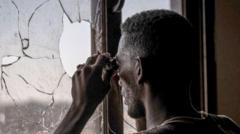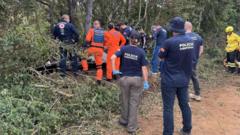On the 80th anniversary of the liberation of Bergen-Belsen, over a thousand survivors and families reflect on the atrocities witnessed at the camp, where tens of thousands of lives were tragically cut short, primarily among Jewish prisoners.
Commemorating Eight Decades Since the Liberation of Bergen-Belsen

Commemorating Eight Decades Since the Liberation of Bergen-Belsen
Survivors and families gather to honor the memory of those lost in the horrors of one of Nazi Germany's most notorious concentration camps.
Eighty years have passed since the harrowing liberation of Bergen-Belsen, and this anniversary brings together survivors and families of the victims to reflect on the unimaginable horrors endured during World War II. As British and Canadian troops stormed the camp in April 1945, they encountered a grim scene that revealed the true scale of Nazi atrocities. As they entered without resistance, soldiers stumbled upon approximately 13,000 unburied bodies and an estimated 60,000 malnourished survivors in a state of despair.
During the commemoration events held recently, more than a thousand attendees, including survivors and relatives, paid tribute to the lives lost at Bergen-Belsen. British soldier Michael Bentine, who later became a well-known entertainer, evocatively described Belsen as "the ultimate blasphemy." Richard Dimbleby, the BBC's first broadcaster on site post-liberation, recounted his experience as "the most horrible of my life," reflecting the pervasive horror that marked those final days of the camp.
Bergen-Belsen rapidly acquired infamy, remaining largely intact unlike other camps. While many horror stories from locations such as Treblinka and Auschwitz had been obscured by the Nazis in their efforts to conceal the genocide, countless eyewitness accounts flooded the world from Bergen-Belsen. Overcrowding led to rampant disease and starvation, claiming an estimated 500 lives daily, with a staggering death toll exceeding 70,000 throughout the camp's existence.
Amid the gathering of survivors, a contingent of 180 British Jews was escorted by the Jewish Military Association (AJEX) to honor their relatives and pay homage at the site, which now holds only remnants of its past. Notable figures, including Deputy Prime Minister Angela Rayner, participated in the ceremony, which included wreath-laying and prayers led by Chief Rabbi Sir Ephraim Mirvis.
With the camp's buildings now reduced to ashes, only memorial stones remain to commemorate those who suffered at Bergen-Belsen, where an inscription marking the resting place of 5,000 individuals poignantly resonates in the serene landscapes of Lower Saxony. The stories of loss and survival continue to echo, haunting the very fabric of history and urging remembrance of those who were tragically lost to unimaginable cruelty.























